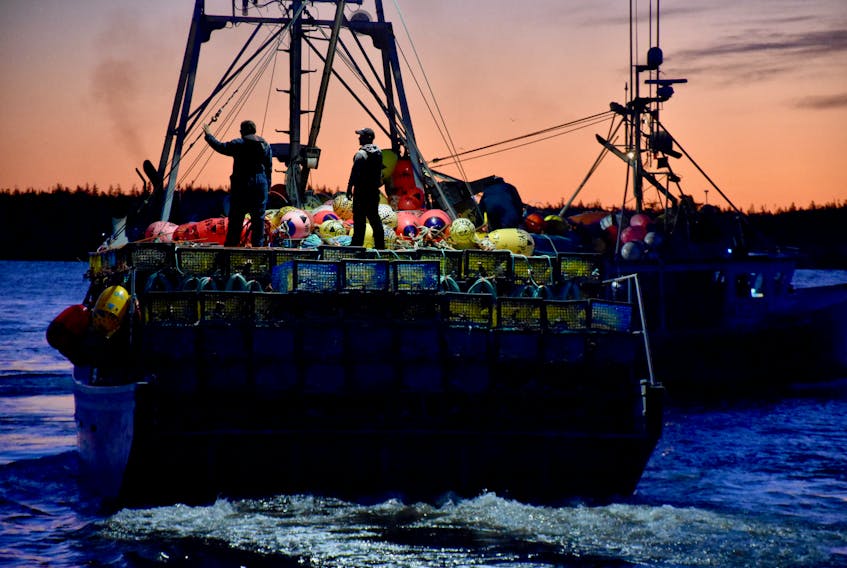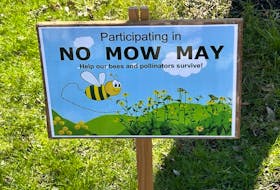In Monday’s pre-dawn dark, someone walking a stretch of Lunenburg County shoreline found his eye drawn out to sea.
There he counted seven gleaming objects — given the time, date and location, surely lobster boats — strung like widely spaced Christmas lights along the horizon.
This man, OK it's me, was swathed in layers of weather-resistant down and polyester. I still shivered at the sight.
At that unholy hour in the day the temperature was about six below. Though no white caps were visible, the ocean emitted a low rumble, which spoke of something ominous out where the lobster boats have probably bobbed for hours.
Once again I was reminded, as I am whenever I stop to think about it, of how detached I am from the objects of everyday life. How I don’t properly appreciate the comforts of my enviable 21st century existence. How I take for granted the things that just appear on the store shelf and, increasingly, at my doorstep.
It makes me feel sheepish to know that men go out in boats into the frigid Atlantic Ocean so, when I’m flush, I can have a feed of lobster.
I know that they are paid well for their catch, thanks, in large part, to a burgeoning middle class with purchasing power in China.
But I’ve also stood before the fishermen’s memorial in Lunenburg that lists the names of the more than 600 folk from Lunenburg County who have lost their lives ensuring that fish gets on all of our dinner plates.
I’ve written stories about fishermen who didn’t come home — commercial fishing being the deadliest line of work in all of Canada — then, that night, tucked into my beloved panfried haddock without a second's thought.
The truth is that I’m like that with most things. Oh sure, the locavore in me tries to keep my beer, beef, cheese and potatoes all from within that magic, 100-mile limit.
But unless the locality is right there in great big letters on the packaging I might have no idea where it came from, let alone how it ended up before me, to give me pleasure.
That is a failing on my part.
It is important to understand that someone somewhere grew the coffee beans, which give me life each morning, and then keep me standing throughout the day. Just as it is vital to realize that without someone’s labour I would have to sit on the ground, rather than on an office chair that resembles James T. Kirk’s throne on the bridge of the Starship Enterprise. When the lights go off, as they tend to do this time of year, it is tempting to shake a fist at the heavens and curse Nova Scotia Power. Maybe instead I should bow my head, perhaps genuflect, towards the south.
Despite NSP’s inexorable push towards renewables, 57 per cent of our electricity still came from coal in 2017. With the exception of a modest amount from Pioneer Coal in Westville, all of the utility’s is imported from the big American coal states and Colombia in South America.
So, it is conceivable that the miracle that I can microwave some popcorn tonight is due to the sacrifices of an indigenous Colombian I will never meet, or a Coloradoan, whose people have been in the collieries as long as they have in Cape Breton.
It is important to remember that.
Just as it is important to keep in mind that any time I print out a document, blow my nose, or read a newspaper like this one, I benefit from the efforts of people who work in the woods — another deeply dangerous line of work — and mind the machines at places like the soon-to-close Northern Pulp plant in Pictou County.
I owe them a lot, every one of us do, even if we don’t know these people’s names, even if we don’t even know where they live.
Sometimes we do.
The woman at the farmers market who grows the garlic that makes the pesto pop.
The guy from the Michelin plant, who I met at the volunteer firemen’s breakfast, who makes the winter tires that get me to work safely and on time.
The folks out in those fishing boats, when I’m almost usually still in the sack, the men and women pulling up their traps from icy waters when it’s a chore for me just to load the coffee Bodum.









